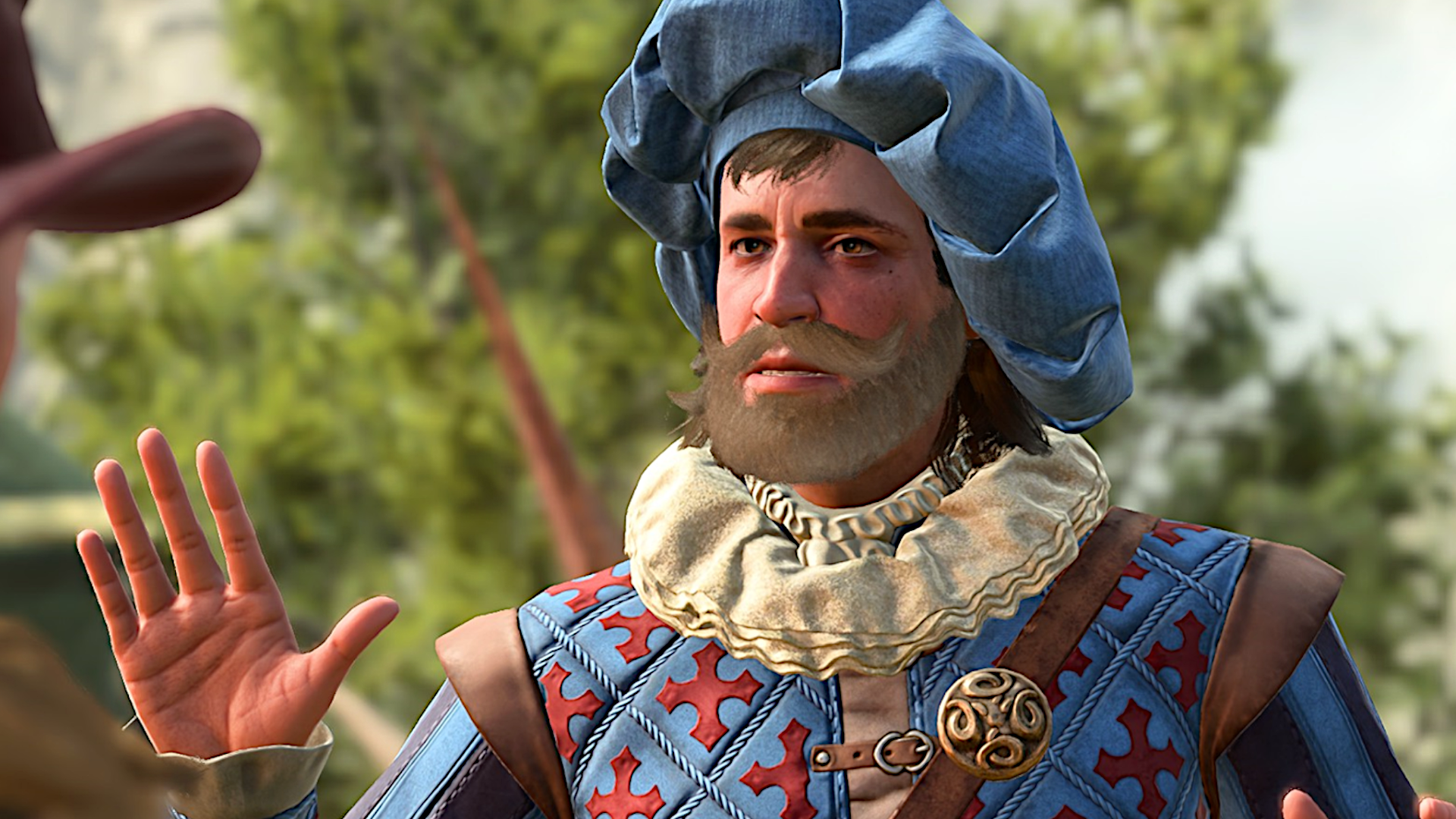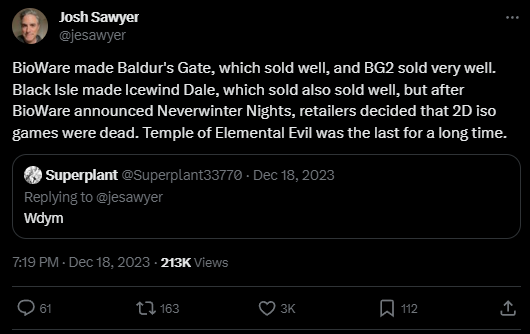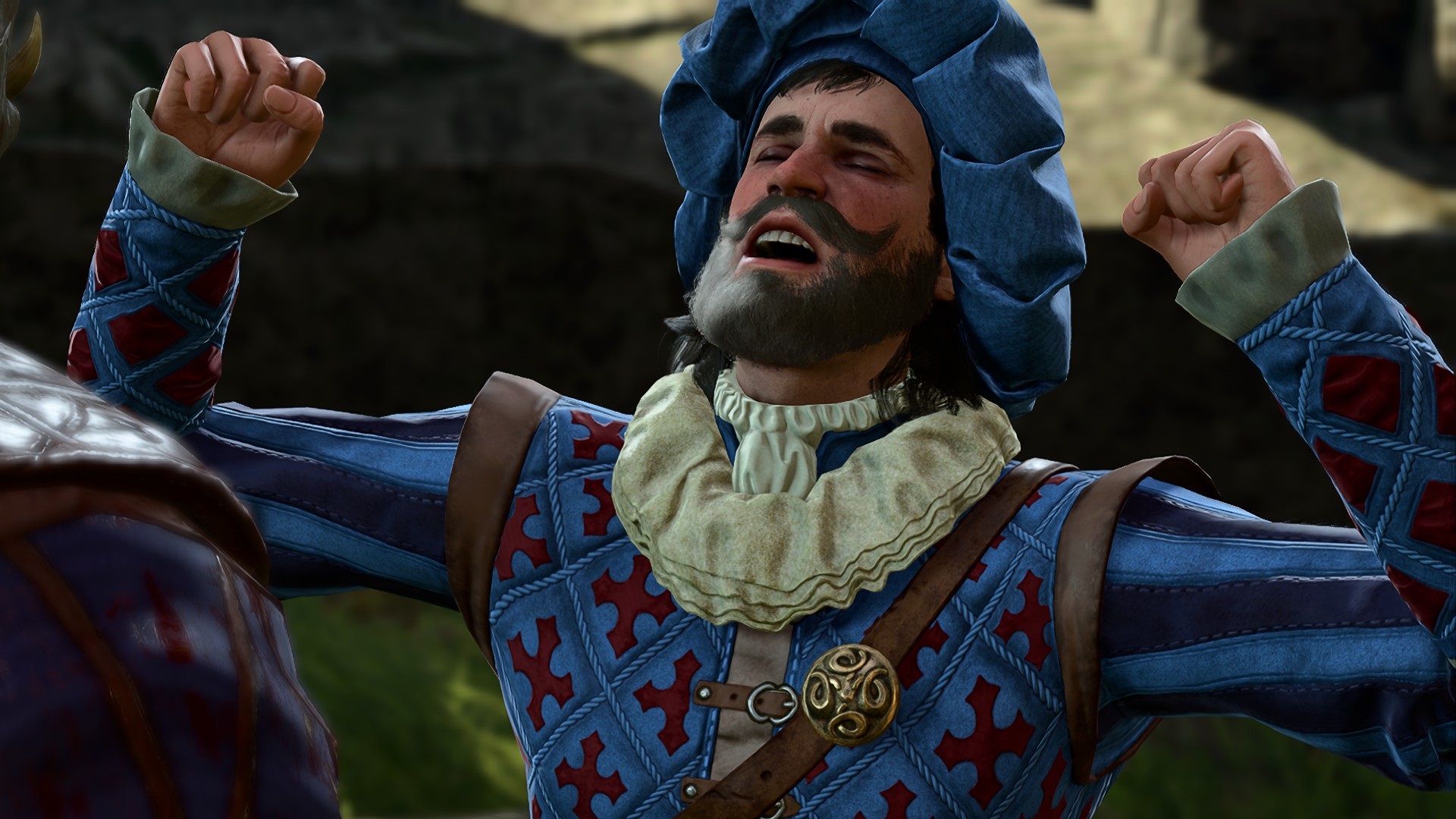Seasoned RPG devs from Obsidian and BioWare blame the temporary death of the isometric CRPG on 'vibes-based forecasting' from retailers
"I can't stress enough how often I'd hear a retail rep declare a genre/style/look was dead with zero supporting data."

Game developer veterans from RPG companies like Obsidian and BioWare say that the temporary death of the CRPG in the early 2000s was down to retailer meddling, as outlined in a series of tweets made just before the holidays.
As spotted by GamesRadar, a conversation between Nathaniel Chapman and Josh Sawyer began to discuss the former role that retail giants played in the life and death of game genres. Chapman is a designer at Timberline with former credits at Blizzard and Obsidian, while Sawyer is a studio design director at Obsidian—having worked on games like Pillars of Eternity and Icewind Dale.
"I completely forgot how big a deal it was for Best Buy/Walmart/etc. buyers to see your game which determined your shelf space and thus your sales," wrote Chapman, to which Sawyer noted that Walmart had been "prudish" about content in the past—while hypocritically clearing the shelves for GTA.
Chapman added: "I think the worst thing was the self-fulfilling vibes about a certain genre or mechanic or whatever not selling well, so the retailers wouldn't stock games with it." Eventually, a commenter asked Sawyer for specifics—which he outlined in a follow-up thread.

According to Sawyer, it was a snake-eating-its-own-tail situation: "I can't stress enough how often I'd hear a retail rep declare a genre/style/look was dead with zero supporting data. Truly vibes-based forecasting, which resulted in self-fulfilling prophecies."
The idea that isometric RPGs aren't popular is hogwash, considering how obscenely well Baldur's Gate 3 has been doing for Larian Studios. While you can make a case that the 2D/pre-rendered backgrounds aesthetic is perhaps outdated, I'd hesitate to even argue that.
Pillars of Eternity did well, and while its sequel didn't sell as Sawyer had hoped, it was still critically well-received—we gave Deadfire an 88 in our review. Whether that was true back in the days of big-store dominance, though, is another thing entirely.
Keep up to date with the most important stories and the best deals, as picked by the PC Gamer team.
Still, retailers aren't the only fallible parties when it comes to CRPGs. BG3 was massively underestimated by Microsoft, despite having a very successful early access period, using an incredibly popular TTRPG licence, and coming from a studio that had already developed the critically-acclaimed Divinity Original Sin: 2.

David Gaider chimed in with something to this effect. Gaider is the co-founder and Creative Director at Summerfall Games—and a former narrative designer at BioWare who worked extensively on the Dragon Age series as its lead writer.
"It wasn't just retailers," Gaider wrote. "There's an 'industry wisdom' which creeps into dev teams where some things are simply declared dead or too old-fashioned, and there's no opposing this certainty up until someone else comes along and proves it's 100% untrue."
Gaider reminds me of a talk that's grown infamous, where Emil Pagliarulo (the lead writer and designer on Starfield) spoke at the STORY conference about his work on Fallout 4 and Skyrim. In it, he makes the assumption that gamers will "tear out the pages" of a game's story and "make paper airplanes" with it, arguing developers ought to "keep it simple, stupid"—limiting a game's narrative to one or two core central themes.
While that might be true in some cases (who among us hasn't skipped a cutscene) Baldur's Gate 3, has a messy, sprawling and multi-layered story that deals with everything from themes of abuse and survivorship to silly, Terry Pratchett-style wholesomeness.
While I'd like to underscore that Pagliarulo said this seven years ago—and that his opinion may have changed—the relative lack of persisting interest in Starfield's world and story is a nice example of what Gaider's talking about: conventional developer wisdom from the story lead at a major studio has been proven wrong, very recently. Granted, Starfield still flew off the shelves.
While big-box retailers are no longer the make-or-break genre setters they once were, thanks to the advent of online stores, I can totally see the lingering frustration from the developer side of the coin—and the player's, too. Pagliarulo came under fire for his assessment because people were yearning for the more complex fallout of yesteryear—and we've lost track of the amount of times PC gaming has been declared 'dead'. Whether it's vibes-based forecasting or vibes-based dev wisdom, games that play it 100% safe are rarely memorable.

Harvey's history with games started when he first begged his parents for a World of Warcraft subscription aged 12, though he's since been cursed with Final Fantasy 14-brain and a huge crush on G'raha Tia. He made his start as a freelancer, writing for websites like Techradar, The Escapist, Dicebreaker, The Gamer, Into the Spine—and of course, PC Gamer. He'll sink his teeth into anything that looks interesting, though he has a soft spot for RPGs, soulslikes, roguelikes, deckbuilders, MMOs, and weird indie titles. He also plays a shelf load of TTRPGs in his offline time. Don't ask him what his favourite system is, he has too many.

